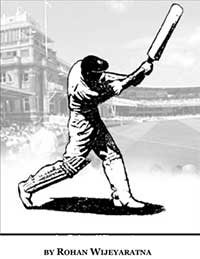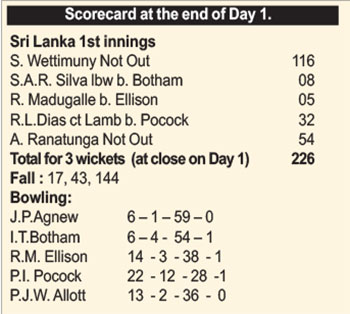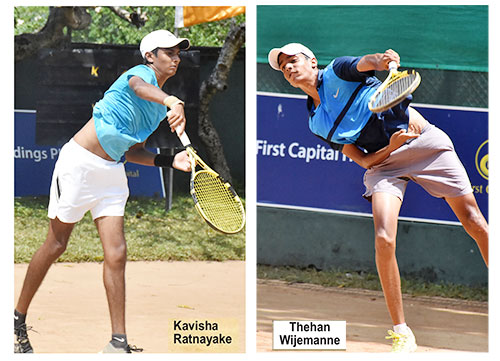Sports
A script gone sour!

36th Anniversary of Sri Lanka’s first ever Test match at Lord’s – Part 1
by Rohan Wijeyaratna
“We’ve actually come here” said the middle-aged man seated next to me, “to watch a proper game of cricket”. Dressed in jacket and a gaudy ‘bacon and eggs’ tie, he was with a group of four others, settling into their seats in the upper tiers of the New Tavern Stand, with the expectation of witnessing an enjoyable day’s cricket. The drift of their conversation seemed no different to the sentiments expressed in the English press and elsewhere, that the game about to begin would be agreeably one sided. Many felt England had a great opportunity of redeeming themselves after the fearful thrashing they received at the hands of the West Indies, earlier that summer.
No one could fault such sentiment. Sri Lanka’s lead up to their first Test at Lord’s had been less than impressive. Beginning 25th July, the Lankans played Nottinghamshire, Surrey, Gloucestershire, Hampshire, Kent, Sussex and Warwickshire and – barring Kent – they failed to bowl out any of the other sides even once. Also, they lost to Surrey. “Not much better than Cambridge University” was the honest appraisal of an experienced county coach, without stooping to insult. Going by the match results at the time, that seemed fair comment.
England’s rough summer
 This was 23rd August 1984. England had suffered a complete ‘blackwash’ earlier that summer at the hands of the West Indies, losing 5-0. The pounding was so intense and intimidating, it prompted cricket sages like Jim Swanton to suggest the drawing of a mandatory line across the wicket, compelling bowlers to pitch beyond it. That the West Indians derived most of their menace through their unrelenting pace there was no doubt, but the extent to which they used the short pitched delivery made it seem that batting was as much an exercise in self defense as it was, in defense of the wicket. Even night-watchmen weren’t spared. Batsmen literally jumped out of their skins with both feet off the ground, trying to keep the ball down, or frantically swaying out of the way to avoid grievous injury. The bowlers were like men possessed. There were not just one or two of them, but often four in tandem; all delivering at furious pace, unrelenting fury and unerring accuracy. Importantly, they were all pitched short of a good length. Whichever side of the divide one belonged, there was no denying this was violent cricket, which fell way short of the game’s famed chivalry. Given all of that, the Sri Lankan match at the tail end of the summer, was expected to offer the perfect antidote to what had gone on before.
This was 23rd August 1984. England had suffered a complete ‘blackwash’ earlier that summer at the hands of the West Indies, losing 5-0. The pounding was so intense and intimidating, it prompted cricket sages like Jim Swanton to suggest the drawing of a mandatory line across the wicket, compelling bowlers to pitch beyond it. That the West Indians derived most of their menace through their unrelenting pace there was no doubt, but the extent to which they used the short pitched delivery made it seem that batting was as much an exercise in self defense as it was, in defense of the wicket. Even night-watchmen weren’t spared. Batsmen literally jumped out of their skins with both feet off the ground, trying to keep the ball down, or frantically swaying out of the way to avoid grievous injury. The bowlers were like men possessed. There were not just one or two of them, but often four in tandem; all delivering at furious pace, unrelenting fury and unerring accuracy. Importantly, they were all pitched short of a good length. Whichever side of the divide one belonged, there was no denying this was violent cricket, which fell way short of the game’s famed chivalry. Given all of that, the Sri Lankan match at the tail end of the summer, was expected to offer the perfect antidote to what had gone on before.
Manna from heaven!
On a murky overcast morning, David Gower won the toss and sensing some possible early inroads, decided to field. As it proved, it was a serious misjudgment. Shortly, Wettimuny and Amal Silva walked out from the shadows of the hallowed pavilion at Lord’s, nervously aware how many illustrious men have trodden those very same steps before. They were greeted with polite applause, and soon everyone had taken their positions. But just before ‘play’ was called, there was an interruption. A scattering of banner waving detractors invaded the field and held up play for several minutes, to the complete bemusement of all! It took a while to connect that this was a demonstration with political connotations. When the ground was finally cleared, it was evident the pitch invasion had left its mark on at least one person in the middle.
Walking to the middle and facing the first ball of a Lord’s Test match could be a daunting task to even the best amongst experienced campaigners. Sidath Wettimuny was no exception. The long walk, then taking guard, taking in the atmosphere, enduring the suspense of the ‘wait’ for the first ball; being sub-consciously reminded of his team’s expectations of him – all these would have created their own share of tensions, adding to the butterflies already in his stomach. Then suddenly, there came the disruption! To an already tensed Sidath Wettimuny, this seemed like manna from heaven!
On his way!
This disruption helped ease the mounting tension within Sidath Wettimuny and soon he was seen busily making explanations to his shell-shocked adversaries as to what the invasion was all about. Just moments before, these very same men had been aggressively scowling at him from the slip cordon and elsewhere, and now they were lapping up every word he uttered, as though it was the gospel! The interlude must have helped dispel all the butterflies in his stomach, for, when play got under way, and a shortish delivery presented itself outside the off, Wettimuny lost no time in getting well on top of it, cutting it neatly to the left of point for two. Shortly thereafter to a ball that was even shorter and wider, he launched into the type of shot he would normally never have played, unless well past 20. It was a well controlled, searing square cut, which sent the leather scuttling away between fourth slip and gully, to register Sri Lanka’s first Test boundary at Lord’s.
Wettimuny continued in this vein, taking most of the strike and doing most of the scoring. Presently, he essayed a sublime drive past point off Botham for four, and then unfurled a sumptuous repeat of the shot off Ellison. At most times he was copybook perfect, and when he wasn’t, he made sure the ball met the bat at its sweetest spot. Wide half volleys were spectacularly square driven while several other memorable strokes followed, as he reached the first of several milestones during his epic innings. He brought up his 50 by rolling off two dashing fours off Agnew in the final over before lunch; the first – an uppish slash over the slips to a very wide ball which stood up, and the other – a near one handed cover drive, coiling and then uncoiling with the shot, in one beautiful symphonic movement. Sri Lanka came into lunch at 81 for 2 with Wettimuny having made 51 of them.
Near vulnerable position
For a while at least within the first hour when the scoreboard read 42-2 after 13 overs, Gower’s decision with the toss seemed vindicated. Even though Jim Fairbrother’s farewell wicket to Test cricket was the friendliest featherbed any batting side could have asked for, and even though the bowling did no justice to the four slips and gully that stood in patient hope, Amal Silva batting with no trouble at all was trapped leg before to a Botham in-swinger. Madugalle the next man in, was comprehensively bowled shortly thereafter, to a delivery which swung back late. This left Wettimuny and Roy Dias to navigate the innings from a somewhat vulnerable position to the safety of the luncheon break, with the game still, evenly poised.
A throwback to a bygone era
If England harboured any hopes of an early breakthrough upon resumption, such hopes were quickly dashed by the two Sri Lankans. What unfolded after lunch was a delightful interlude of sublime Asian batting artistry, where wristwork, footwork, placement and touch, were amply displayed in a throwback to a by-gone era of technically correct batting, laced with style and unending grace. There was no further evidence needed to showcase the cricketing pedigree of both these batsmen. Relying mostly on his water-tight technique and his lyrical off-side driving, Wettimuny shortly reached his hundred in the 54th over, out of a total of 154. As the entire ground stood to him in warm applause, it was evident that the spirit of cricket was alive and well, and good cricket was being recognized; never mind from where it came.
Dias meanwhile, not to be outdone, displayed shades of his undisputed class. His regally elegant off-side play was complemented with decisive clips through midwicket to anything that was on his pads. He had not just style and grace, but command as well in all his offerings, but just when the stage was really well set for one great innings to remember, Dias fell victim to a clever piece of deception by the wily Surrey off- spinner Pocock. The bowler enticed him to go through with the shot, to a ball that hadn’t quite arrived and Dias paid the penalty. He made 32 out of a 102 run partnership from 150 minutes of batting.
In his element
 The departure of Roy Dias brought the pugnacious 21 year old Ranatunga to the center. Looking every bit as cheeky as he always was, Ranatunga quickly set about scuttling the bowling with an array of off side shots, using no noticeable back lift and curbing himself until the ball was almost upon him. He would then lean into it with some muscle and scuttle it away, be it from backward point to long-on. Anything that was on his pads, he would deftly deflect backward of square, with the assurance of a man who was in complete control of himself.
The departure of Roy Dias brought the pugnacious 21 year old Ranatunga to the center. Looking every bit as cheeky as he always was, Ranatunga quickly set about scuttling the bowling with an array of off side shots, using no noticeable back lift and curbing himself until the ball was almost upon him. He would then lean into it with some muscle and scuttle it away, be it from backward point to long-on. Anything that was on his pads, he would deftly deflect backward of square, with the assurance of a man who was in complete control of himself.
Wettimuny meanwhile, was increasingly stricken with cramp and was content on playing second fiddle. This allowed Ranatunga to take on the bulk of the bowling. The leftie would busily square drive or punch on the off, picking gaps or creating them, while gorging himself on the bowling as if it were a plate of rice. At tea, Sri Lanka were 173 for three and by the end of the day’s play 30 minutes before the scheduled close, they were 226 for three. Amply blessed with patience and style, Wettimuny returned unbeaten on 116 on a day he could do no wrong even if he tried. Ranatunga remained unbeaten on 54.
To be continued tomorrow.
- News Advertiesment
See Kapruka’s top selling online shopping categories such as Toys, Grocery, Flowers, Birthday Cakes, Fruits, Chocolates, Clothing and Electronics. Also see Kapruka’s unique online services such as Money Remittence,News, Courier/Delivery, Food Delivery and over 700 top brands. Also get products from Amazon & Ebay via Kapruka Gloabal Shop into Sri Lanka.
Sports
Imran steals the show!

(This article by The Island’s respected cricket columnist Rohan Wijeyaratne first appeared in these pages 16 years ago; on the 11th of June 2005. As World Cup winning former captain and current Prime Minister of Pakistan Imran Khan has just visited the island, we reproduce this article in today’s edition)
In my youth – which is to say, quite a long time ago – I would often go to the YMCA canteen for a snack and a tea after whatever business that brought me to the Fort. Doing the same recently more for old times sake than anything else, I saw a familiar figure ahead of me heading in the same direction. Quickening my step and drawing abreast, I introduced myself to the gentleman concerned. He was none other than my old school English teacher, V. Thanabalasingham.
Not just a teacher, but an Institution
Those of you who may have passed through the portals of Ananda College during the 1960s and the early 70s and no doubt been well rounded in many ways, will admit to a man that when it came to the teaching of English, the name Thanabalasingham held no peer. In his prime, he was not just a brilliant teacher but an Institution. And volumes wouldn’t suffice to do him justice – such was the impact he made on all whom he touched, be it with the brilliance of Thackeray, Dickens, Chaucer or the Direct Method English Course that served as our bread and butter in English education at the time.
Another, from a different mould
Another teacher from an entirely different mould was Upali Ratnayake, now the Executive Director of CIMA. At the time he was introduced to us at the ‘A’ level stage, he appeared to our free spirits a cut above the rest. He acquired this status by doing exactly the opposite of what he was expected to do, which was to teach us English as a preparatory step towards an easier passage through University. Upali Ratnayake actually taught us nothing. Yet we learnt a good deal off him, discussing almost everything other than the subject he was paid for! His most endearing virtue was that he never spoke to us from a great height. And in that process, he taught us one of the most lasting lessons in life.
Several decades later, I nearly fell off my chair to receive a phone call from him inviting me to the BMICH on the 28th of May where Imran Khan and Kumar Sangakkara were due to speak at the CIMA Global Leaders Summit. The topics for discussion were “Passion for Perfection” and “Ordinary people in extraordinary acts.” The topics and the speakers seemed irresistible. And so I went.
What a speech!
I wasn’t disappointed. Neither were hundreds of others present. And predictably, Imran stole the show. Blessed with a presence that would have put any Grecian god to second class status, this tall, elegant and immensely handsome man spoke with such brilliance, clarity and articulation, the end result was as gripping as it was inspiring. In his wake, those who followed appeared cumbersome and dreary, almost like how Kenny Mackay would appear after the brilliance of a vintage Sobers or a Dexter! Kumar Sangakkara having to make do with less time than was his rightful share went largely unheard, tending to speak more to his fellow panelists than his audience. He will learn. As a probable hot contender to the top post after Atapattu, there will be many more occasions where he will be required to speak in public.
“Ambition must be upgraded, never downgraded”
Imran was of the view that all humans were endowed with limitless potential. Their limits if any, were often self imposed. Those who achieved extraordinary heights were those who dared to go beyond their self imposed limits. They thought big, dreamed big and did not allow their limitations to get in the way of achieving their dreams. He drew parallels from his own experiences in cricket, his cancer hospital project and his involvement in national politics to establish the point.
The four secrets
Starting with cricket, and drawing parallels with other legends including Zaheer Abbas, Imran stressed the need for a clear vision, the hunger to succeed, the willingness to sacrifice and self belief as being the four secrets to achieve one’s vision. Self belief was a factor which Abbas, despite all his God given gifts, had in very short supply. Imran, on the other hand, was full of it (sometimes foolishly!), because he never thought he ever could lose a game each time he stepped on to a cricket field. He gave many examples of it, including the victories against the might of the ‘invincible’ West Indians in 1986 against all odds. And that, despite having requested and got, ‘neutral’ umpires in a home series in Pakistan! He just wanted to make sure that when they won, there would be none to say that the umpires had anything to do with it!
Drawing from examples of his own life, Imran said that in all one’s life, one would hear others say why something cannot be done. That if accepted, would be the start of everyone’s downward spiral. Ambition he said, must be upgraded, never downgraded. And the more you pit your mind against the winds that resist you from reaching your ambition, the stronger your mind will become. Therefore, ambition must take precedence over everything. And towards achieving that, one should be willing to sacrifice anything. “Compromise” said Imran “for your vision, but never ever on your vision.” Great words!
Why the 3rd world is the 3rd world!
Relating what made him take to politics, Imran said that the problem with the third world was that the ruling elite would put itself above the law and deprive the ordinary folk of any justice. Hence his political movement was primarily meant to establish the rule of law in his country, where the weak and the strong were equal in the eyes of the law. “No society in the history of mankind has ever progressed without the rule of the law. The reason why the third world remained the third world was because it had very poor rule of the law. The elitist types did whatever they wished and got away with it, while the common man and the small and medium industrialist were all deprived of justice.” None could have spoken a truer word!
The ways of the mafia
Imran went on to say that when fighting for the rule of Law, one would be pitted against entrenched vested interests; the most powerful elite in the country. These were those who could buy justice. In Imran’s case, these were men who were also his good friends. Yet he preferred to take on the mantle of a social pariah instead, preferring to stand steadfast to his vision. The mafia usually reacts in such situations in either of two ways. They would either eliminate you or make you join the system. Just five months after his party was formed, he was offered 30 seats in Parliament out of 270. Imran refused, because he realized he had no chance of winning against entrenched political families that controlled his country. He knew the moment he joined them, he would need to compromise with his vision. So he refused, and got wiped out at the elections.
Refusing the Prime Ministership of Pakistan
When General Musharaff took over with Pakistan’s fourth military dictatorship in its brief history, he made all the right noises such as ridding the country of “sham” democracy and so on. No sooner Musharaff formed his own party, Imran was yet again invited, this time to become the Prime Minister of Pakistan. “But when I discovered that joining his coalition meant joining the biggest crooks in the country,” he had no difficulty in refusing. He was chided for his decision by many who argued that he could have joined and then fixed things up. But Imran said the decision was easy to make, as his vision was very clear. And it was one’s vision that decided when to compromise and when not to.
Imran’s vision
Imran’s vision was an independent and credible judicial system in Pakistan. So he asked himself the question, could General Musharaff afford an independent judiciary? The answer to him was obvious. If such a judicial system prevailed, most of the powerful men in his country would be tried for treason under article six of the country’s constitution. The sentence for treason was death. And he was therefore convinced that neither Musharaff, nor those around him could afford an independent and credible judicial system. And so, with his firm “No” Imran watched his party being destroyed yet again, to one seat, in parliament. This time it was by General Musharaff himself.
(To be continued tomorrow)
Sports
Spinners give India early advantage in third Test

Indian spinners shot England out for just 112 inside two sessions with Ravichandran Ashwin and Axar Patel sharing the spoils after pacer Ishant Sharma opened the floodgates in his milestone 100th match on the opening day of the day-night third Test in Ahmedabad yesterday.
England were all out for 112 in 48.4 overs in the second session on a spin-friendly Motera pitch with Patel (21.4-6-38-6) grabbing his second five-for in his second Test while Ashwin (16-6-26-3) took three.
Openers Rohit Sharma (5) and Shubman Gill (0 ) negotiated five overs to take India to five for no loss at the dinner break.
 Gill, however, survived after TV umpire ruled him not out in the third over after England claimed for a catch.
Gill, however, survived after TV umpire ruled him not out in the third over after England claimed for a catch.
Ishant, only the second Indian fast bowler after Kapil Dev to play in 100 Tests, fittingly took India’s first wicket in the third over as he dismissed opener Dominic Sibley for nought.
Thereafter, it was all an Ashwin and Patel show as the duo bamboozled the England batsmen to complete the submission, except for the other opener Zak Crawley, who hit an eminently delectable half-century. Six English wickets fell in the second session.
England did not have any substantial partnership with the 47-run stand for the third wicket being the highest. They lost their last seven wickets for just 38 runs.
Crawley’s brilliance was, however, neutralised by the Indian spinners as England were left reeling at 81 for four going into tea after an exciting opening session in the pink ball Test.
Two wickets fell in as many overs after the resumption of the second session, with Ashwin and Patel taking one each, to reduce England to 81 for 6.
Ashwin sent Ollie Pope’s (1) off-stump cart-wheeling with a beauty of a delivery, bowling round the wicket, before Patel trapped Ben Stokes (6) LBW in the next over with a ball that spun in.
Jofra Archer (11) did a tad better as he hit a four in the second ball he faced and another boundary off Ashwin. But, Patel had him soon, cleaning up his off-stump to send England innings into a mess.
England’s rapid slide continued with Jack Leach edging one to the gully where Cheteshwar Pujara took a low catch off Ashwin, though the TV umpire took time to confirm the decision.
Crawley’s effort was the only silver lining for England. Having missed the first two Tests due to a freak wrist injury, the stylish right-hander’s driving was elegance personified as he hit ten boundaries during his 84-ball 53.
Sports
Top players secure third round places

SSC Open Ranking Tennis
Thehan Wijemanne, Kavisha Ratnayake, Vibuda Wijebandara, Savith Weerasinghe, Kiran Viravanathan, Archana Lokuge advanced to the men’s singles third round at the SSC Open Ranking tennis tournament on Tuesday.
Some of the leading players fighting to improve on their impressive performances produced at the Tennis Nationals and the Colombo Championships during recent weeks knocked out their opponents easily to secure third round places.










